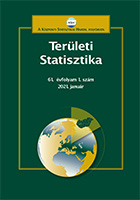Az ázsiai közvetlentőke-befektetések sajátosságai a visegrádi országokban: a beruházási stratégiák és a
termelékenység összefüggései
Asian Foreign Direct Investment (FDI) in the Visegrad Countries: Relationships between investment strategies and labour productivity
Author(s): Zoltán Gál, Gábor FazekasSubject(s): Social Sciences, Economy, Geography, Regional studies
Published by: Központi Statisztikai Hivatal
Keywords: China; Japan; South Korea; Visegrad Countries; FDI stock; labor productivity
Summary/Abstract: The aim of the study is to explore the Asian FDI motivations (those of China, Japan and South Korea) in the Visegrad countries. The research seeks answers about the extent of the dependency of the Asian investments on the productivity indicators of the destination countries. Productivity is considered an important factor in terms of added value, therefore its strategic management is of paramount importance. Regarding productivity, significant differences have been detected between individual destination countries over the past decade which may influence further influx of FDI in the long run. The correlation analysis and the Granger causality test showed that in the vast majority of cases there are correlations between productivity of the Visegrad Group states and the volume of investments of the three Asian countries. Results have shown that the level of labour productivity is a key consideration for FDI by all three Asian investor countries. Japanese and South Korean investments have a positive effect on the productivity levels of the host CEE countries, while Chinese FDI is driven by the higher productivity indicators of the host countries.
Journal: Területi Statisztika
- Issue Year: 61/2021
- Issue No: 01
- Page Range: 105-130
- Page Count: 26
- Language: Hungarian

